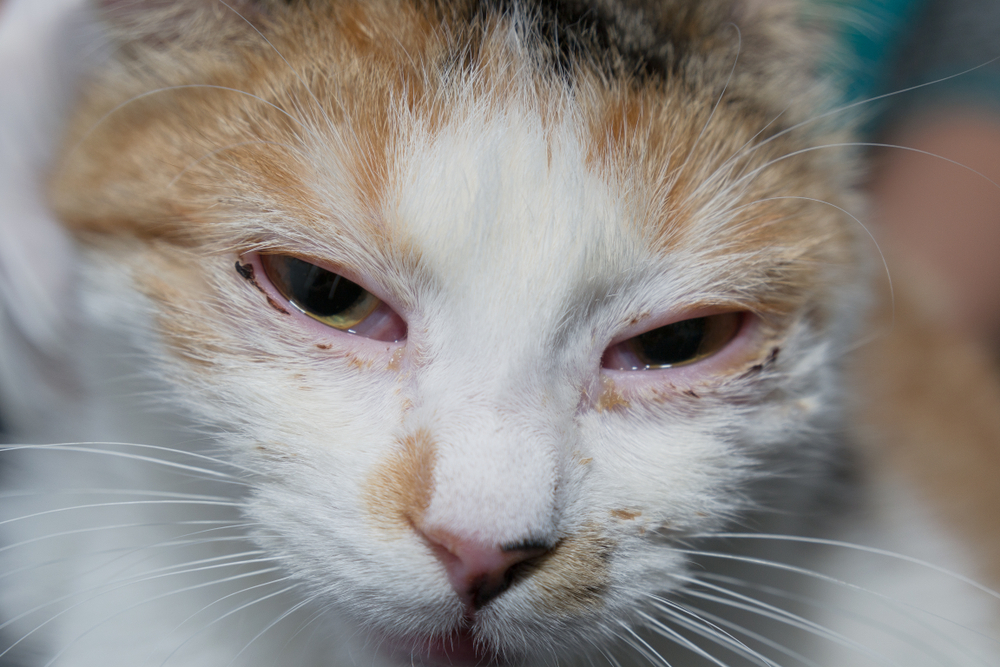Feline viral diseases are a significant concern for cat owners. These diseases, caused by various viruses, can affect cats of all ages and breeds and lead to a range of symptoms from mild discomfort to severe illness and potentially death. Understanding the most common viral diseases that cats can contract is essential for pet owners to protect the health and well-being of their feline companions. Our Shuler Veterinary Clinic team highlights the most prevalent viral diseases affecting cats, including their causes, signs, prevention, and treatment options.
Feline viral rhinotracheitis
Feline viral rhinotracheitis (FVR), also known as feline herpesvirus type 1 (FHV-1), is a highly contagious virus that affects the feline respiratory system. Easily spread through respiratory secretions, such as aerosolized droplets shed by sneezing and coughing, the virus can also be transmitted via contact with contaminated objects like bowls, bedding, and litter boxes.
If your cat develops an FVR infection, they may have signs such as:
- Sneezing
- Nasal discharge
- Eye inflammation (i.e., conjunctivitis)
- Fever
- Appetite loss
- Lethargy
Vaccination is the most effective way to prevent FVR infection, along with minimizing stress and maintaining a healthy environment for your cat. Treatment involves supportive nursing care to manage symptoms and may include antibiotics for secondary bacterial infections.
Feline calicivirus
Feline calicivirus (FCV) is another common respiratory virus that affects cats, often in conjunction with FVR. This virus is also similar to FVR in that it spreads through direct contact with infected cats or contaminated objects, such as food and water bowls.
In addition to the upper respiratory issues FVR causes, FCV can also lead to painful oral ulcers. This key difference helps differentiate between the two viral infections, although treatment is typically the same.
Prevention strategies include vaccination, good hygiene practices, and minimization of exposure to infected cats. Treatment focuses on supportive care to manage symptoms, including pain relief for oral ulcers, fluid therapy, nutritional therapy, and antibiotics for secondary bacterial infections.
Feline panleukopenia virus
Feline panleukopenia virus (FPV) is a highly contagious viral disease that affects the gastrointestinal tract. Common in shelter situations, FPV spreads through contact with bodily fluids and feces from infected cats, or indirect contact with contaminated environments.
FPV is a parvovirus, so it causes clinical signs that are similar to those of canine parvovirus. If your cat contracts FPV, they may develop:
- Vomiting
- Diarrhea that may be bloody
- Fever
- Lethargy
- Dehydration
- Appetite loss
Vaccination is highly effective in preventing FPV infection, along with strict hygiene practices and quarantine measures for infected cats. Treatment involves supportive care to manage symptoms, including fluid therapy, anti-nausea medications, and antibiotics to prevent secondary infections. However, FPV often proves fatal despite aggressive treatment, especially in unvaccinated kittens.
Feline immunodeficiency virus
Feline immunodeficiency virus (FIV) is a retrovirus that weakens a cat’s immune system, similar to HIV in people. Transmission primarily occurs through bite wounds inflicted during fights between cats, making FIV infections most common in intact male cats who live outdoors.
Since FIV attacks the immune system, the medical issues this disease causes vary greatly and may include:
- Chronic skin or urinary tract infections
- Weight loss
- Poor coat condition
- Dental problems
- Recurrent illnesses
- Increased susceptibility to illness
Prevention involves keeping cats indoors to prevent exposure to infected cats and managing inter-cat aggression within households to prevent fights. While there is no cure for FIV, supportive care can help manage symptoms and prolong the cat’s life.
Feline leukemia virus
Feline leukemia virus (FeLV) is another retrovirus that suppresses the immune system and can lead to various diseases, including cancer. Transmission occurs through close contact with infected cats since the virus is shed through saliva, urine, and feces.
As with FIV, FeLV can cause a wide range of medical issues, including:
- Anemia
- Stomatitis and other dental problems
- Weight loss
- Poor appetite
- Enlarged lymph nodes
- Recurrent infections
- Leukemia and other cancers
Prevention strategies include vaccinating cats, keeping them indoors, and testing new cats before introducing them to the household. Treatment focuses on supportive care to manage symptoms and prolong the cat’s life.
As the guardian of your feline friend, it’s crucial to be aware of the most common viral diseases that can affect cats and take proactive measures to prevent them. Vaccination, good hygiene practices, regular veterinary visits, and minimization of exposure to infected cats are key strategies in safeguarding the health and well-being of your whiskered pal.
Don’t leave your feline friend unprotected from potentially life-threatening viral diseases. Give our Shuler Veterinary Clinic team a call or schedule online to set up a vaccination appointment.









Leave A Comment